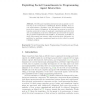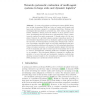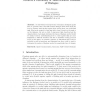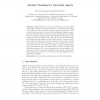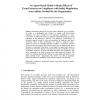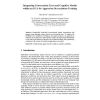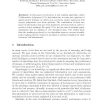497
Voted
PRIMA
2015
Springer
9 years 10 months ago
2015
Springer
Abstract. Formal argumentation-based dialogue systems have attracted considerable research interest in the past. Most research in this area introduce “dialectical wrappers” ove...
453
Voted
PRIMA
2015
Springer
9 years 10 months ago
2015
Springer
Abstract. Modeling and regulating interactions among agents is a critical step in the development of Multiagent Systems (MASs). Some recent works assume a normative view, and sugge...
468
Voted
PRIMA
2015
Springer
9 years 10 months ago
2015
Springer
Abstract. A common hypothesis in multi-agent systems (MAS) literature is that decentralized MAS are better at coping with dynamic and large scale problems compared to centralized a...
474
Voted
PRIMA
2015
Springer
9 years 10 months ago
2015
Springer
Abstract. Handling inconsistency is an inherent part of decision making in traditional agri-food chains – due to the various concerns involved. In order to explain the source of ...
466
Voted
PRIMA
2015
Springer
9 years 10 months ago
2015
Springer
To deal with a broad spectrum of domains, intelligent agents have to generate their own task-oriented dialogue that stems from the need to interact with another agent when solving ...
443
Voted
PRIMA
2015
Springer
9 years 10 months ago
2015
Springer
Module checking is a decision problem proposed in late 1990s to formalize verification of open systems, i.e., systems that must adapt their behavior to the input they receive from...
440
click to vote
PRIMA
2015
Springer
9 years 10 months ago
2015
Springer
Maintaining high levels of safety under conditions of ever increasing air traffic is a challenging task. Failures to comply with safety-related regulations are often considered to ...
462
Voted
PRIMA
2015
Springer
9 years 10 months ago
2015
Springer
Traditionally, Embodied Conversational Agents communicate with humans using dialogue systems based on conversation trees. To enhance the flexibility and variability of dialogues, t...
PRIMA
2015
Springer
9 years 10 months ago
2015
Springer
Abstract. Leximin AMODCOP has been proposed as a class of Multiple Objective Distributed Constraint Optimization Problems, where multiple objectives for individual agents are optim...
107
Voted
PRIMA
2015
Springer
9 years 10 months ago
2015
Springer
In this paper we introduce a new ranking algorithm, called Collaborative Judgement (CJ), that takes into account peer opinions of agents and/or humans on objects (e.g. products, ex...

